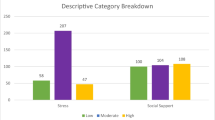Abstract
Many features of learning disability, including confusion in perceiving and processing information, an unpredictable course of development, and difficulties with social cueing, create chronic stressors for the disabled child and his family. Self-psychology is explored as a psychodynamic model with unique pertinence for understanding the potential intrapsychic effects of learning disability. Comparisons to drive and ego psychology models are made, and implications for intervention are suggested.
Similar content being viewed by others
References
Abrams, J. & Kaslow, F. (1976). Learning disability and family dynamics: A mutual interaction.Journal of Clinical Child Psychology, Spring 1976, 35–40.
Cruickshank, W. & Lerner, J. (1983).Coming of Age. Syracuse, N. Y.: Syracuse University Press.
Cruickshank, W. & Tash, W. (1984).Academics and Beyond. Syracuse, N. Y.: Syracuse University Press.
Edge, D., Strenecky, B. & Mour, S. (Eds.) (1978).Parenting Learning-problem Children. Columbus, Ohio: Ohio State University Press.
Eissler, R., Freud, A., Kris, M. & Solnit, A. (1977).Physical Illness and Handicap in Childhood. New Haven: Yale University Press.
Erikson, E. (1950).Childhood and Society. New York: Norton.
Erikson, E. (1959). Identity and the life cycle.Psychological Monographs. New York: International Universities Press.
Gitterman, A. & Shulman, F. (Eds.) (1986). Harassed and alone: Parents of learning disabled children.Mutual Aid Groups and the Life Cycle. Itasca, Ill.: Peacock, 195–209.
Greene, L. (1983).Learning Disabilities and Your Child. New York: Fawcett.
Kirby, E. & Grimley, L. (1986).Understanding and Treating Attention Deficit Disorder. New York: Pergamon.
Klein, S. (1982). The Role of the family in helping the child with learning disabilities. Davis, M. & Whitener, J. (Eds.).Proceedings of the Learning Disabilities Institute II. Springfield, Ill.: Charles Thomas.
Kohut, H. (1971).The Analysis of the Self. New York: International Universities Press.
Kohut, H. (1977).The Restoration of the Self. New York: International Universities Press.
Kohut, H. (1984).How Does Analysis Cure? Chicago: University of Chicago Press.
Kronick, D. (1978). The Family and learning disabilities.Learning Disabilities: Information Please. Quebec: Canadian ACLD.
Kronick, D. (1981).Social Development of Learning Disabled Persons. San Francisco: Josey-Bass.
Lachmann, F. (1986). Interpretation of psychic conflict and adversarial relationships: A self-psychological perspective.Psychoanalytic Psychology, Vol 3, 4, 341–355.
Levine, M. (1988).A Table of Key Neurodevelopmental Functions and Their Performance Elements. Cambridge, MA: Educators Publishing.
Levine, M. (1984). Learning: abilities and disabilities.The Medical Forum. Cambridge: Harvard University.
Levine, M. (1982). The unhappy wanderers: Children with attention deficits.Pediatric Clinics of North America, Vol 29, 1.
MacCracken, M. (1986).Turnabout Children: Overcoming Dyslexia and Other Learning Disabilities. Boston: Little Brown.
Mezio, P. (1983).Parenting Children with Disabilities. New York: Marcel Dekker.
Osman, B. (1979).Learning Disabilities. A Family Affair. New York: Random House.
Palombo, J. (1987). Clinical issues in self psychology. Caroff, P. & Gottesfeld, M. (Eds.)Psycho-Social Studies. New York: Gardner.
Palombo, J. (1985). The treatment of borderline neurocognitively impaired children: A perspective from self psychology.Clinical Social Work Journal, 13 (2), 117–128.
Palombo, J. & Feigon, J. (1984). Borderline personality development in childhood and its relationships to neurocognitive deficits.Child and Adolescent Social Work, 1, 18–33.
Pine, F. (1983). Disturbances of learning and behavior in childhood.Developmental Theory and Clinical Process. New Haven: Yale University Press.
Shane, E. (1984). Self-psychology: A new conceptualization for the understanding of learning disabled children. Stepansky, P. & Goldberg, A. (Eds.).Kohut's Legacy. New York: Analytic Press.
Silver, L. (1984).The Misunderstood Child: A Guide for Parents of Learning Disabled Children. New York: McGraw-Hill.
Smith, S. (1978).No Easy Answers: The Learning Disabled Child. Rockville, MD: NIMH.
Stepansky, P. & Goldberg, A. (Eds.). (1984).Kohut's Legacy. New York: Analytic Press.
Vigilante, F. (1986). Reassessing the developmental needs of children with learning disabilities: Programmatic implications.Child and Adolescent Social Work, 167–180.
Vigilante, F. (1983). Working with families of learning disabled children.Child Welfare 62, 429–436.
Weiss, M. & Weiss, H. (1976).Home is a Learning Place: A Parent's Guide to Learning Disabilities. Boston: Little Brown.
Woodrich, D. & Joy, J. (1986).Multidisciplinary Assessment of Children with Learning Disabilities and Mental Retardation. Baltimore, MD: Brookes.
Author information
Authors and Affiliations
Rights and permissions
About this article
Cite this article
Rosenberger, J. Self-psychology as a theoretical base for understanding the impact of learning disabilities. Child Adolesc Soc Work J 5, 269–280 (1988). https://doi.org/10.1007/BF00755391
Issue Date:
DOI: https://doi.org/10.1007/BF00755391




